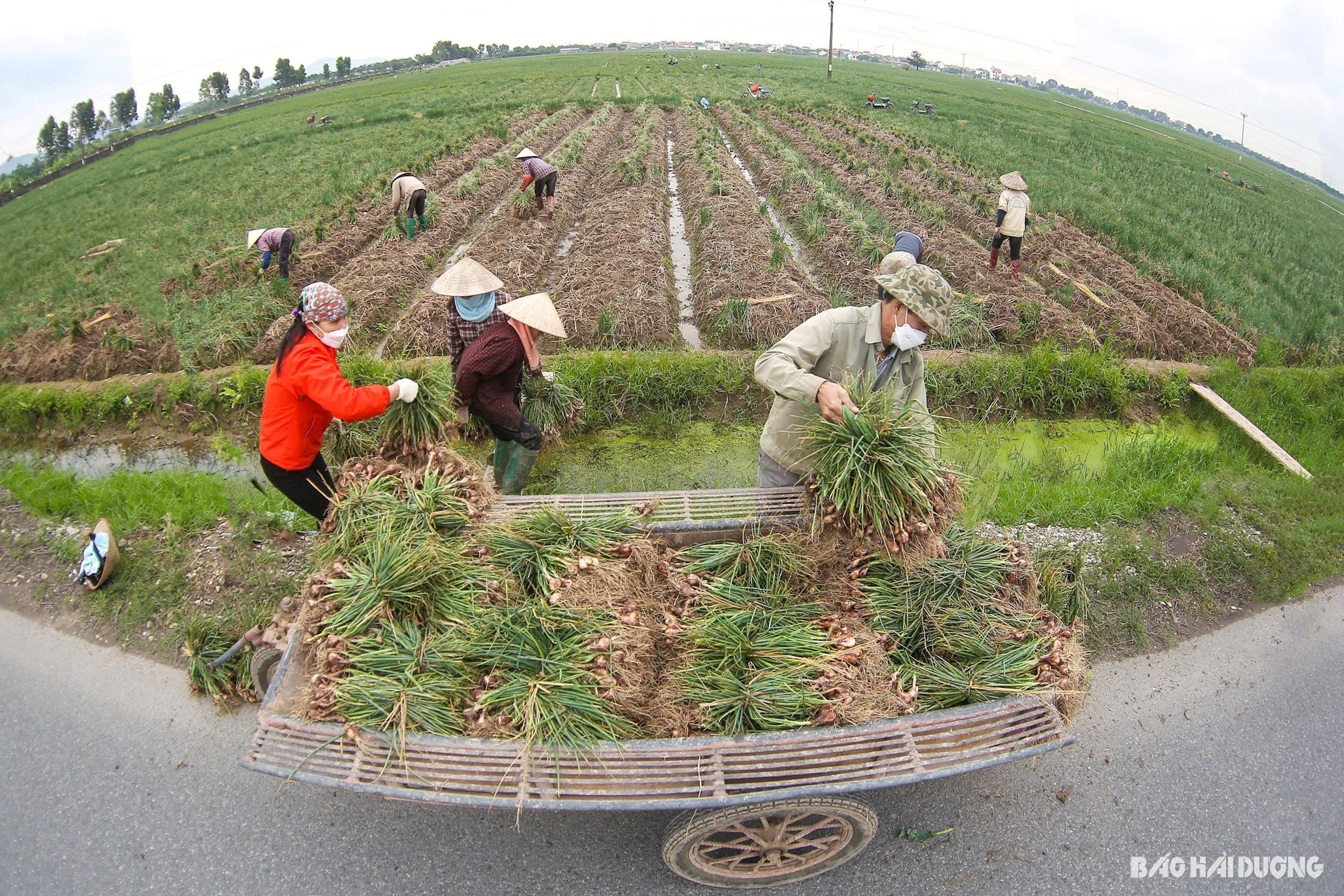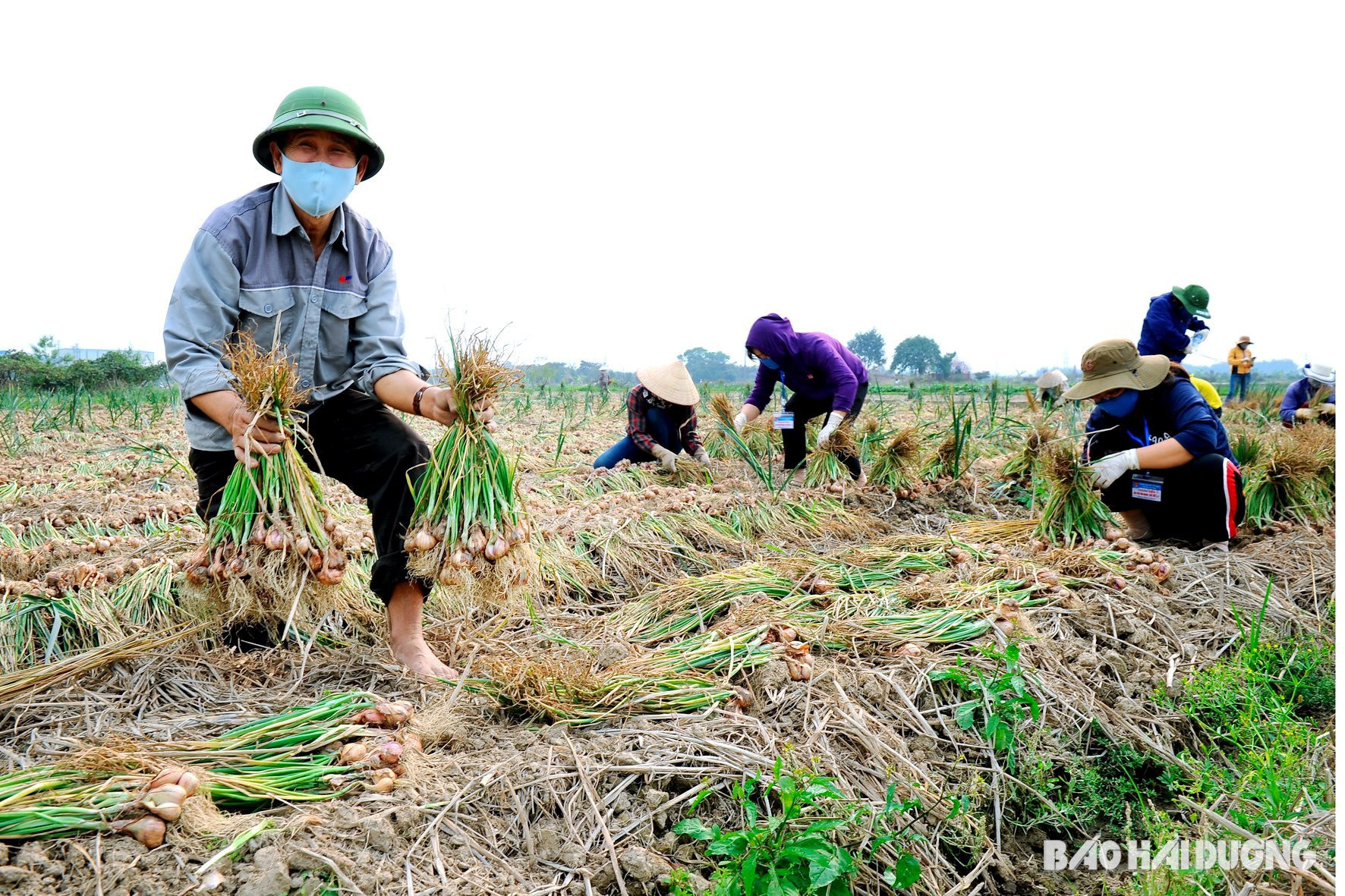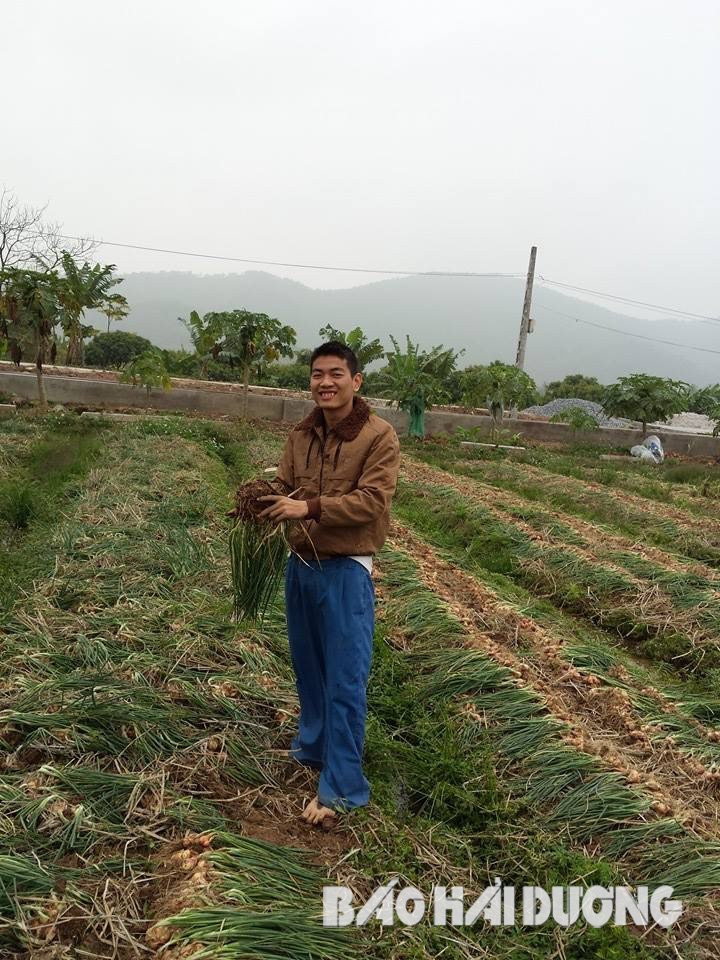Every child of Kinh Mon town (Hai Duong) is proud of their hometown onion and garlic plants that have nurtured their childhood with both material and spiritual values.

More than 20 years ago, when I was a boy, I often followed my parents and siblings to the fields to prepare the soil, make beds, and then plant each onion and garlic branch in the fertile, nutrient-rich soil of the Kinh Thay River in my hometown of Kinh Mon. Then I also went with my family members to the fields to water, fertilize, and harvest the onions and garlic. I remember that usually around September and October, when we started the new school year, it was the onion and garlic planting season. Each onion and garlic season that passed meant I was a year older, a new generation.
Although onions and garlic grow and develop in winter - the season when people are afraid to wade in the fields or touch cold water - I always like to go to the fields. Of course, in addition to helping my parents, it is also an opportunity for me to play and have fun. Sometimes I play in the water ditches in the onion and garlic beds; sometimes I collect straw to roast onions and garlic, then warm them up and blow on them to eat in the middle of the windy winter fields... Going to the fields every day, watching the onion and garlic sprouts gradually sprout is really interesting. That is also the reason why I eagerly look forward to going to the fields.
Growing onions and garlic is very elaborate and requires a lot of steps. My parents spent most of their time in the fields taking care of the plants so they could grow in the best way possible. Back then, there weren’t as many chemical fertilizers as there are now, so I remember my mother often carrying buckets of urine or bags of organic fertilizer to the fields to fertilize the plants. Not only my mother, but other households also did the same as a “movement”. Because life in the countryside doesn’t waste anything, everything is a resource, everything can be regenerated.

More than 20 years have passed, but how can I forget the spicy taste in my eyes and nose every time I helped my mother separate each onion seedling to prepare for planting. How can I forget the early mornings when my mother often sent me to the field to prune a few fresh onion clumps to fry with rice, and in the afternoons, my mother sent me to the field to prune a few garlic plants to cook with buffalo blood (not with buffalo or beef). The fragrant smell of onions and garlic mixed with fat wafted from house to house, making gluttons like us always thirsty. How can I forget the days when I went to pick up onions and garlic from the fields that had been harvested and then sold them to traders. Sometimes I got 1-2 kg/day, sometimes I was lucky to get 6-7 kg/day, which meant I earned 10-15 thousand VND. I was not a snacker, so I saved that money in a piggy bank to use for my studies.
The onion and garlic harvest season comes early some years, late some years, but usually falls near and right after Tet. Perhaps that is why the people of my hometown have "given birth" to a very unique concept: If the onion and garlic harvest is good, we will celebrate a big Tet, if not, we will celebrate a small Tet. I still remember the years when there was drizzle and wind, the stalks were withered and the soil stuck to the bulbs so it was impossible to pull the onions by hand. At that time, I had to use a shovel to dig up each onion clump and then painstakingly shake off the clumps of soil on the onions. Nowadays, harvested onions and garlic are arranged on hanging "houses" (iron frames welded to the house walls), but in the past, my family used to hang onions and garlic wherever possible, such as on lychee branches, custard apple branches, jackfruit branches, and walls... Days of running from the rain, days of covering the onion and garlic clusters with tarps are also daily memories in my mind.

Onions and garlic are now quite expensive and many farmers have become rich from onions and garlic. But in my memory, onions and garlic were very cheap back then. My mother and I each rode a bicycle, carrying huge bags of onions and garlic over the high Mong slope to Phuc Thanh (now Quang Thanh commune, Kinh Mon town) and only earned about 100-200 thousand VND. One year, my mother said that after deducting all the "input" costs, selling onions and garlic was considered enough capital and at that time, we mainly took labor to make profit... Farming was so difficult and hard, but no one gave up. Back then, no one abandoned their fields. They still persevered in planting and planting, then sowed hope for a bountiful harvest like sowing hope in their children. In my memory, I still remember the sad, bewildered faces of my parents when the onions and garlic bulbs did not grow big, withered early, and were cheap. Because in the winter in rural areas like my area, what else can people look forward to besides onions and garlic? That is the money for food, living expenses; the money to pay tuition for me and my siblings…
Big and small bags of onions brought me to the university gate. I remember after Tet, when I was about to go to school, my parents had to sell so many bags of onions and garlic. Onions and garlic were often sold early and did not get a good price, but my parents had to do it because they knew what else to sell to make money for me to bring to school. Every time I held that amount of money, my heart ached, I just wanted to go to work quickly to earn money so my parents would not have to pay any more allowances. Onions and garlic also appeared in gift packages sent to teachers and friends, and everyone praised Kinh Mon onions and garlic for their spicy, strong, and rich flavor, different from onions and garlic from other regions.
Now, as I type these words, the city has fallen asleep, and I am still dreaming of the lush green onion and garlic beds; of the radiant faces of the farmers who “work hard in the sun and the rain” in my hometown. Today, onions and garlic are of better quality, have higher prices, and have been positioned as “the golden brand of Vietnamese agriculture”, but my family life has had its ups and downs, its changes. My father - the farmer who worked hard, patiently, tilling each clod of soil, bending his back to carry heavy loads of onions and garlic - has passed away. My mother - the woman who “sold her face to the ground, her back to the sky” every day beside the onion and garlic beds - is no longer concerned with farming, because she has come to Hanoi to live with me.
Remembering onions and garlic is remembering a time in my memory and I silently thank it for making me appreciate life more, appreciate the value of labor.
NGO KHIEM